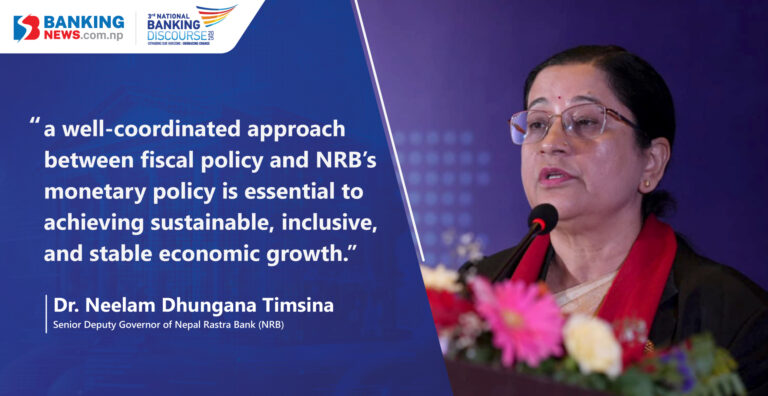Kathmandu – Dr. Neelam Dhungana Timsina, Senior Deputy Governor of Nepal Rastra Bank (NRB), stated that the 3rd National Banking Discourse has played a vital role in helping the government achieve its goals for sustainable development, prosperity, and overall financial stability. Speaking at the event, she highlighted the significant impact the discourse has had in promoting the banking sector, especially in relation to the implementation of monetary policies adopted by NRB.
In her remarks during the first session titled “Challenges of Credit Expansion in Nepal: Targeted Measures, Sectoral Alignment, and Other Possibilities”, Dr. Dhungana noted that Nepal’s banking sector has undergone significant transformations in size, nature, and service delivery. In urban areas, banking services have become more accessible, with nearly three-quarters of the population now holding bank accounts.
She emphasized that banks are required to allocate a specific portion of their credit portfolio to productive sectors, including agriculture, energy, and micro, small, and medium enterprises (MSMEs). According to NRB policy, by 2084 B.S. (2027 A.D.), commercial banks must invest 44% of their credit in these priority sectors, development banks 20%, and finance companies 15%. To increase access for marginalized groups, banks are also mandated to allocate 5% of their total lending to deprived sectors—either directly or through microfinance institutions.
Despite a notable increase in credit flow in recent years, economic growth has remained sluggish. Dr. Dhungana acknowledged this disconnect and stressed NRB’s focus on ensuring credit leads to tangible outcomes. She added that various aspects of credit expansion and productivity would be discussed and analyzed during the discourse.
The second session of the event will focus on “Innovative and Existing Practices for Addressing Credit Expansion Challenges in MSMEs and Our Preparedness.” She pointed out that with a large portion of the population working abroad, Nepal risks missing out on economic opportunities. MSMEs, including micro and cottage industries, have the potential to generate domestic employment, raise income levels, and reduce poverty.
Dr. Dhungana shared that efforts are underway to ensure that banks and financial institutions (BFIs) channel more impactful credit toward MSMEs. Currently, commercial banks have directed around 11% of their lending to this sector. She expressed hope that the discourse would lead to in-depth discussions and actionable recommendations, which NRB is open to adopting.
The third session is titled “Open Banking and Fintech: Collaboration, Competition, and Regulatory Framework for Neo-Banks in Nepal.” With fintech companies emerging as strong competitors to traditional BFIs, these entities are using data-driven innovations to reach underserved communities. Fintechs are helping expand financial services in areas where traditional bank branches are not accessible, thereby advancing financial inclusion.
Recognizing the rapid growth of technology, Dr. Dhungana emphasized the importance of adopting global practices and enhancing collaboration between banks and fintechs. Plans are underway to operate a “Digital Finance Hub” and develop a national fintech strategy to further boost this sector in Nepal.
The fourth session of the program will focus on “Breaking the Cycle of Economic Slowdown: Strategic Partnership Between Fiscal and Monetary Policy.” Dr. Dhungana stressed that a well-coordinated approach between fiscal policy and NRB’s monetary policy is essential to achieving sustainable, inclusive, and stable economic growth. She expressed expectations for an in-depth discussion on these themes during the session.



 About Us
About Us
Comment